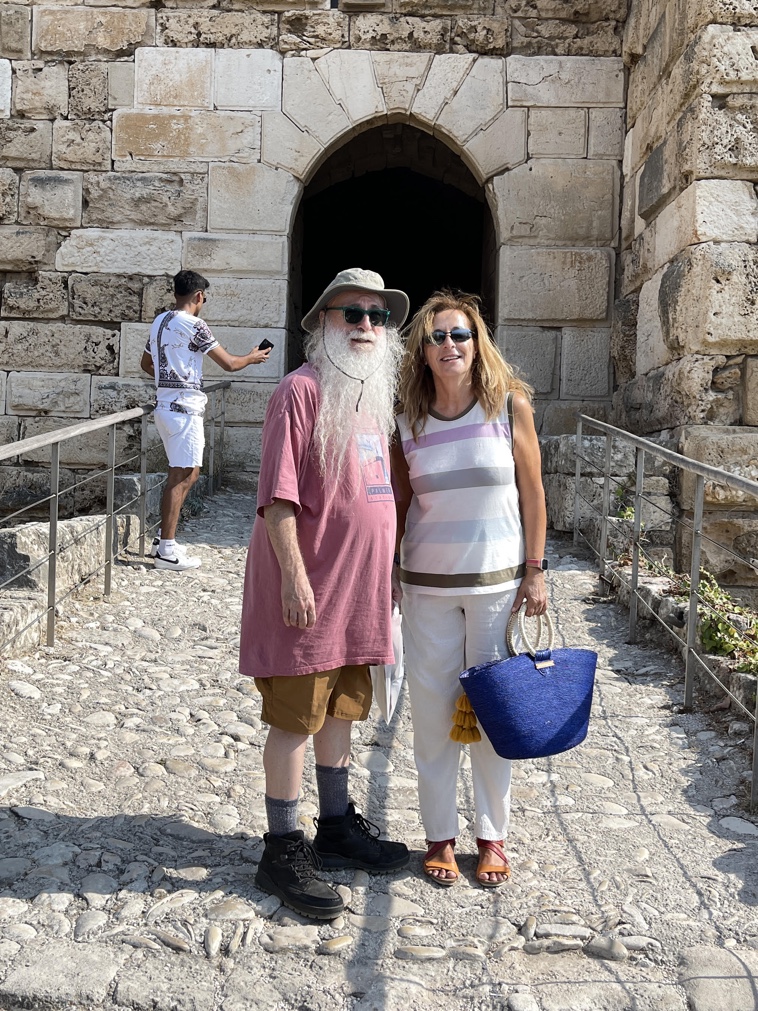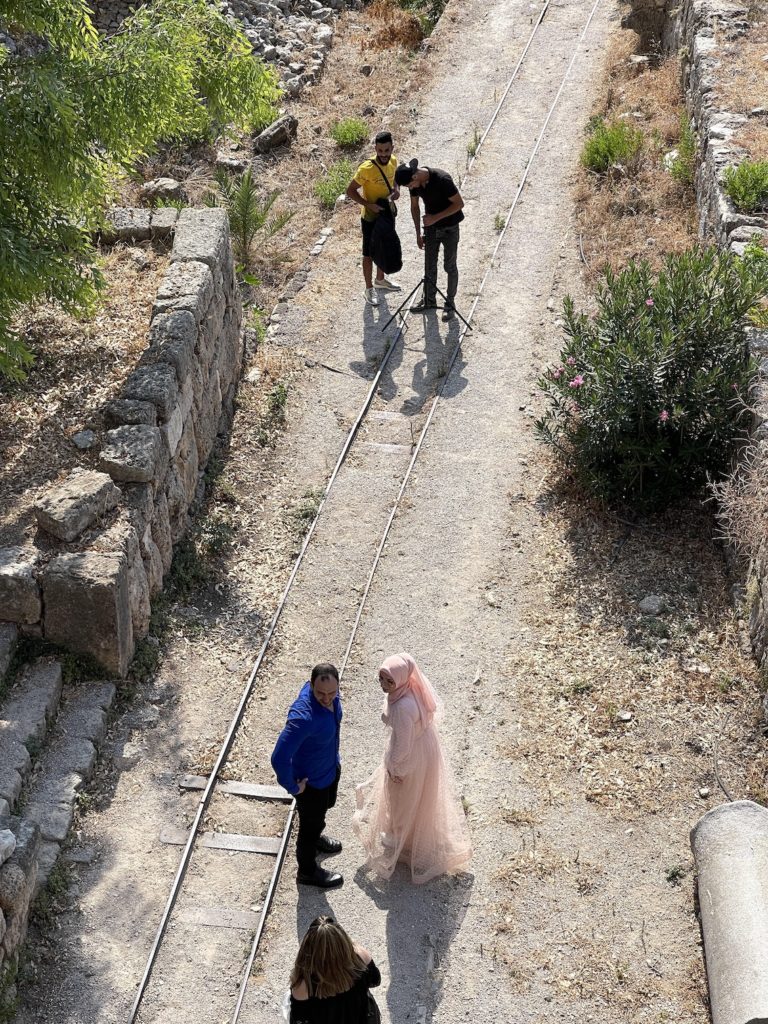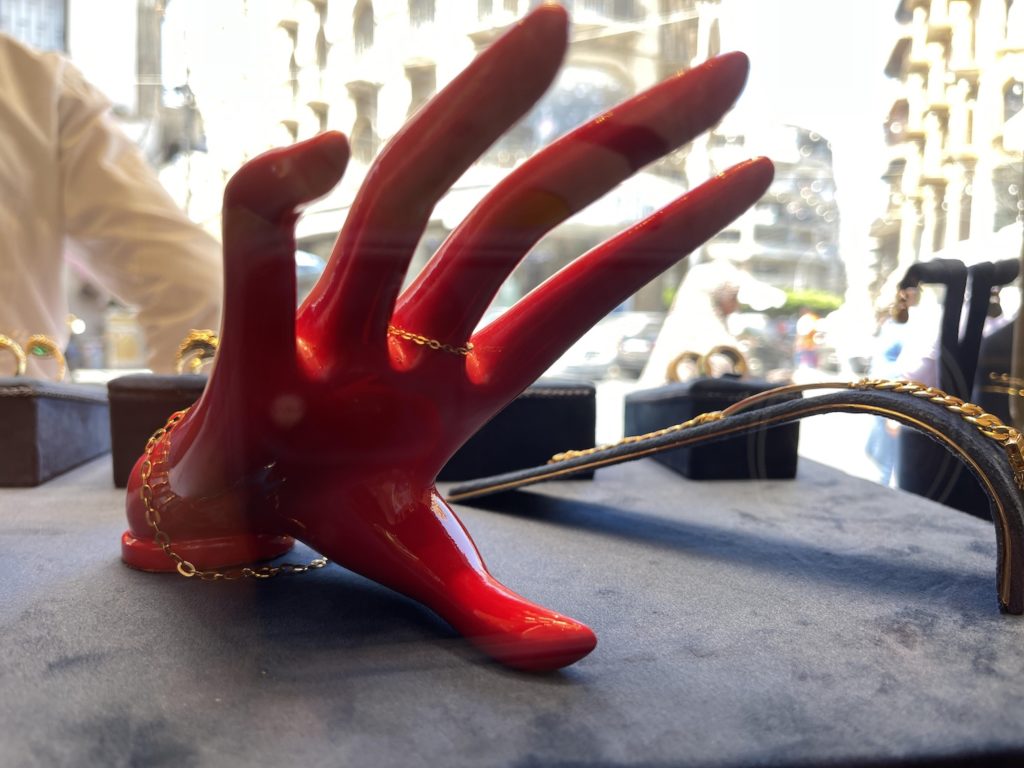Flying over, you realize how many places you’ll never go.
And so to the Levant. The people in this part of the world are so universally hospitable that it’s hard to believe their national pastime is killing each other based on their conflicting opinions about the prophets of a loving god. But that’s just atheist talk. The reality is that even if they were all Great Lakes Region Council of 1879 Northern Conservative Baptists of single digit consanguinity, there still wouldn’t be enough water to support all of them and the upcoming families of the adorable children carpeting the streets. And they are adorable. The family we are staying with are exemplary. The youngest daughter is a great beauty, and seems to have taken as a challenge finding a boyfriend better looking than her two brothers. It’s hard to say, among the three men. Someone will lob an apple into one of their wedding parties one day and reignite the Lebanese Civil War.
When we got out of the passport line (much better managed than the one in Stockholm) and past the officer (who was being pretend-thorough but could tell at a glance we were not the droids he was looking for and was just punching the clock since some piece of software in the back room expects him to spend 90 seconds interacting with each customer), Hind found us straightaway, and took us to the taxi she had retained. We drove an hour and a half through the night time city to her house in Batroun. The coast of Lebanon is entirely urban, from what I’ve seen, both the shoreline and on the hills rising into the distance. After eight thousand years, you don’t expect much wilderness.
Sunday, August 14
Hind and I walked into town to buy odds and ends. It was partly modern and partly traditional. The modern part was an ordinary supermarket, with procedures slightly revamped to accommodate runaway inflation: if you pay with a card you have to pay half again as much, in cash, to account for inflation during the period it takes the card to be processed. Everybody pays in cash. After that, we went to an ice cream shop run by a childhood friend, who also grinds coffee and changes money. It’s important only to change the dollars that you need on a particular day, since the Lebanese Pound is currently losing about a half a percent per day.
(The official rate against the dollar is about 1500 to 1, while the actual rate is approaching 32000 to 1. On receipts, the government requires the amount in dollars to be printed at the official rate, which leads to silly printouts like an $1800 trip to the grocery store. Officially, the government has the power to forbid websites to post the actual exchange rate. They asked for help in implementing this from the U.S. government a year ago…this didn’t lead anywhere…)
In the afternoon, we decided to go visit the UNESCO World Heritage Site of Byblos, which is just down the road. One of the features of the site is the Old Souk, which continues to operate vigorously. There is also a citadel:

There are capers growing out of the 5000-year-old walls. The same plant that you get marinated in little bottles all over the culinary world. All stages seem to exist at once – the buds, the flowers, the berries. Pretty little flower, lots of stamens sticking out, like Passiflora. An old railroad track runs out toward the ocean. Lebanon had railroads until the 1970’s, when they were torn out probably for the same reason American railroads were torn out, except here they forgot to build freeways to replace them. A wedding photographer was photographing a bride and groom with ruins in the background. I suppose it evokes Cultural Continuity but it might be taken Ominously.

We got another taxi back up the coast from Byblos, to a resort with a seafood restaurant in Batroun. Again, far too much food. Food waste is the mark of the middle classes of a lot of different countries, as are pudgy little kids waddling out of the ocean to the outdoor showers and back to the safety of their video games and hotel rooms.
Monday, August 15
Hind’s clan showed up in the morning with a tour bus. The objective was Baalbek. The bus took us up the Kadisha Gorge over a pass and into the Bekaa Valley. Properly one should spend many days here and not just drive past the gorge, but it is a spectacular bunch of views and hairpin turns ensure that people on both sides of the bus will get a chance to see the monasteries and hermit caves and vineyards and a good amount of traffic where people decide to double park in Bsharri. At the pass, a man was selling roasted almonds.
We had the almond seller take a group photo. Clearly he was hip to the conversation, and noticed that the coming thing (minus n years) was framing diagonally, and among the other photos, he took that one. Do you notice how good the public-facing people are getting at taking pictures? Waiters, tour guides, security cams? The selfie stick turned out not to conquer the universe and render human interaction superfluous, as I had hoped. I’ve seen two selfie sticks on this trip. They were specifically invented to avoid having to hand your phone to strangers, but people just crave the company, now.
On the Bekaa side, our driver pointed out the marijuana fields along with the vineyards.
We got to Baalbek in the afternoon. It isn’t a huge site, and I think I got a look at the important parts. And checked the tourist box of getting yelled at for taking photos. A Japanese lady with a very nice voice was singing in the Temple of Bacchus (for which there is no evidence of Bacchic intent, said the guide, but it is called that nowadays.) I made a few seconds of video and one of her entourage came up and asked “English”? “What are you doing?” and I said, I’m a tourist, I’m taking pictures. I was being un-Japanesely abrupt I know but that’s a lot of nerve, expecting someone to not take photos at a world heritage site because — because why? She was singing. How did this get to be Intellectual Property or a Reasonable Expectation of Privacy or even A Bunch Of Mohammedans With Guns or any of the traditional reasons you stop taking photos?
Baalbek is an impressive site but only one guy in the souk had post cards for sale, at least where we were wandering. It’s hard to pursue hobbies in a fast paced crowd of ten.
The feast afterwards had more constraints, as Hind’s daughter and her boyfriend are vegan, so it was required to order more than Mixed Grill. One of her sons and his girlfriend are vegetarian. And the other son and his girfriend eat everything. The icons of Lebanese food are vegan anyway — hummus, tabbouleh, babaganoush, olives, falafel, muhammara, dolmas — and I sat at the end of the table with Noura so I got a lot of that. Dave was more in the middle.
Tuesday, August 16
We took a day off of violent touring, instead blogging and writing post cards — all these words take time, you know — and at the end of the day, going into town to sit at a rooftop cafe on the beach and do whatever one does at rooftop cafes overlooking the beach. I had hoped for a green flash, but there was a marine layer close to the ocean that turned the sun red before it got to the horizon. Maybe the same people who are blocking the GPS.
Doing ordinary stuff in another country is time consuming as well. I got lost on the way to the money-changer’s, despite that I was nearly standing in front of it, and had to FaceTime with Noura in order to get the last ten meters straight. I barely know how to use FaceTime, either. And the door to the post office fronts onto a parking lot behind a guard who didn’t care that I was there so that’s one problem less. The postage to America is about 8 cents, at this day’s exchange rate, but if you read online what people have to say about LibanPost, and do the Expectations = Probability x Winnings things or the Dollar Cost Averaging thing or any of the other popular forms of risk analysis — I only bought a few stamps, to send to an experimentally chosen focus group. When I took the stamps back to the post office, the lady hand cancelled them in front of me. The post office had nobody in it either time, and the people were very nice. I gather everybody real uses DHL. (It turned out they were reliable: the cards I sent arrived to America in eight days!)
Wednesday, August 17
We all piled into taxis to go to the Gold Souk in Tripoli. When we got to Tripoli, a short drive up the coast, we all piled into the Tic Tac Cafe. It was never about the gold souk, it was only about eating.
Tripoli is a generic big noisy commerce-drowned city. Lots of beggars. The women dressed entirely in black burkas are all beggars. Regular women have varying, less complete, covering. I first encountered the all-in-black beggar phenomenon in Bucharest in 1999. It must represent some formality. In Bucharest, they were bent over in balasana holding their cups out in front, but the ones here are walking around and sometimes even tugging at your sleeve for attention.
Hind is a regular at the Tic Tac Cafe. The proprietors have lived in California and Florida before, is my understanding. Father and son and maybe another generation or maybe just hired hands. The food is wonderful, especially the fuul, but just too much of it. Traveling with vegans is a good way to assure that you’ll have the tastes of a place and not just piled up mixed grill all the time.
The second food stop was a candy store such as you might find in Vienna or Berlin, except with all different stuff. Everything feels air conditioned.
The third stop, was more of a coda: a boring jewelry store in which all the guys sat on benches while Noura and Hind and Sarah were treated deferentially by the store owners.

After about a half hour of this, the remaining six decided to go home — well, Sami and Elias decided, and we follow them — but the taxis roaming around the area were pretty sketchy and a half hour of talk happened and then Dave and I and Elias got in one taxi and Gaby and Rachel and Sami got in the other taxi and we drove off to Batroun, except that our old guy had to stop to fill up with propane, and then on the slope up to the tunnel which lies 5 km north of town, he pulled over and told Elias that his brakes had stopped working.
He added brake fluid. It did not fix the problem. By this time the other taxi had pulled up and they talked and they talked and eventually the decision was to all six of us pile into the working taxi and drive the last 5 km to town. Rachel sat on Sami in the front seat, Gaby and Dave and I in the back, and then Elias levered himself by using the door for compression. He told me later he was sitting on the door handle. I turned sideways a bit. There are worse things in the world than being pressed up against a stud like Elias. Sami and Elias argued all the way back about where to turn. Not with each other, so much, as with their phones. Google Maps kept offering verbal instructions to turn right where there was not even the trace of a road. Don’t know where it thought we were. When we got back, there was a lot of discussion about money. The first taxi driver had insisted on being paid most of what was agreed upon (600,000?) because he’d made it most of the way there. The second taxi wanted some unspecified amount more money because his taxi had been commandeered as a Clown Car. I hope they worked it out.
Thursday, August 18
Travel days are consumed with travel, even if the flight is on the following morning at 4:30 AM. We made a reservation at the premier airport hotel in Beirut, the Assaha, and around 9 AM got in a taxi to go to that hotel, stopping briefly for last minute shopping at the much nicer souk in Byblos.
When we got to Beirut, we found that Google Maps did not know where the Assaha hotel was. Took us to some parking structure. Our driver didn’t know either; he works in Batroun. There was a lot of guessing and chatting and everything moved very slowly in Beirut and ultimately it turned out that Google Maps thinks it’s the Alsaha hotel. Apple Maps had it right the whole time, and Dave reported the mistake to Google, who has been very effusive in its praise ever since.
The Assaha is a very nice hotel, over the top, even, in Disney Aladdin decor. I don’t know how busy it is: a pigeon had laid two eggs in out balcony planter, and seemed shocked that there were people in the room. I hope we didn’t scare it off. We had one really nice last meal in Lebanon, of sausage, dandelion greens, pastries, and pudding.
We went to sleep super early (6pm) and got something like a night’s sleep.
We got up around 1am and met the taxi the hotel had arranged for us (their own dedicated shuttle), and got to the airport and on to the plane without any particular hitch. I’m getting to hate my friends with diplomatic passports, though.
The GPS failed coming out of the Beirut airport and didn’t come on again until over Cyprus. Once a philosopher, twice a Google Search, and there are a LOT of articles since about 2018 about GPS failures in the Eastern Mediterranean. most of them are advising pilots and ship navigators that they should be prepared to use alternative means. I didn’t surf long enough to get to any theories about who is doing it.